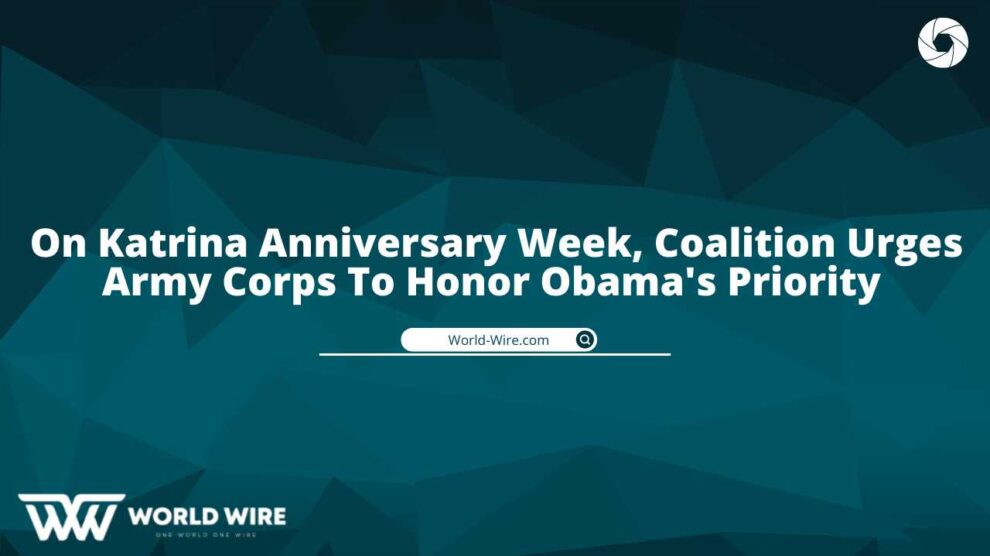A coalition of 17 advocacy organizations called on the U.S. Army Corps of Engineers today, three days before the fourth anniversary of Hurricane Katrina (August 29), to respect the president’s focus in his budget and campaign “to repair nature’s barriers – the wetlands, marshes, and barrier islands that can absorb the initial blows and safeguard the people of the Gulf Coast.”
This message was delivered by members of the MRGO Must Go Coalition during a news conference and media tour to highlight the slow progress being made to restore wetlands along the Mississippi River Gulf Outlet (MRGO) east of New Orleans in order to safeguard the Lower 9th Ward and St. Bernard Parish. Those are the two coastal towns where Katrina caused the most destruction.
The Lower 9th Ward Center for Sustainable Engagement and Development co-director Pam Dashiell stated, “The more vulnerable coastal towns are to hurricane devastation, the more it costs the federal government – and taxpayers – to assist those communities rebuild after a disaster.” The Gulf Coast and the American economy were both severely damaged by Katrina, which also cost approximately $90 billion in property damage alone.
The largest port in North America, crucial energy production facilities, and sizable commercial and recreational fisheries are all located along the Louisiana coast. The national economy might be seriously affected if these industries are disrupted as a result of storm damage. Fuel prices increased as a result of Katrina’s significant infrastructure destruction and crucial refinery damage, some of which remained out of commission for an entire year.
According to Craig Taffaro, president of St. Bernard Parish, “given the fragility of our country’s economy, restoring the wetlands to preserve the Gulf Coast must stay at the forefront of the numerous congressionally-approved Corps projects countrywide.” “It must be given top importance. Critical restoration projects should be designed and built as quickly as possible by the Corps. We must continue to give coastal restoration initiatives high priority. It is crucial to maintain the Corps’ involvement in ensuring our safety.”
The loss of 1/3 of Louisiana’s native wetlands, or around 2,000 square miles, an area larger than Delaware, contributed to the severity of Katrina’s impact there.
Charles Allen, assistant director of the Center for Bioenvironmental Research at Tulane and Xavier Universities and co-director of the Lower 9th Ward Center for Sustainable Engagement and Development, stated that scientists “agree that these lost wetlands could have helped reduce Katrina’s storm surge.” “Because they absorb storm energy, delay incoming waves, wind, and surge waters, wetlands act as “horizontal levees” that are frequently more affordable and efficient in preventing damage than man-made vertical levees. It is widely acknowledged that in order to stop comparable or worse storm damage in the future, we urgently need to restore these wetlands and coastal woods.”
Despite these facts, the U.S. Army Corps of Engineers has not finished the projects’ design and engineering, which has prevented Congress from funding the significant coastal restoration projects it approved in the 2007 Water Resources Development Act.
While the MRGO has already been closed by the Corps, the MRGO Ecosystem Restoration Plan won’t be finished until March 2011, which is required before the Corps can ask Congress for financing to reconstruct the wetlands and cypress woods that will help safeguard New Orleans. Nearly three years have passed since the May 2008 deadline set by Congress.
Colonel David Dysart, chief administrative officer for St. Bernard Parish, said: “The continuing Corps projects are significant, but there must be a continuous feeling of urgency to repair the natural deltaic ecology, infrastructure, and the Mississippi River navigation system.” “We need a clear commitment from the Corps, Congress, and other responsible agencies that they won’t let outmoded bureaucratic procedures stand in the way of necessary action. There are good people at the Corps and at other pertinent federal agencies who are trying to get their job done and quickly move these projects forward. The stakes demand nothing less than inventiveness and a willingness to abandon certain entrenched corporate practises.”
John Koeferl, a resident of the Lower 9th Ward’s Holy Cross Neighborhood Association, remarked, “There is fresh optimism in New Orleans owing to a new president.” “The Louisiana shore has to be rapidly restored, and President Obama has vowed to do it. He pointed out that every four miles of wetlands can hold back approximately a foot of a hurricane’s storm surge. The President’s priority should be respected by the Army Corps of Engineers.”
A coalition of 17 environmental, community, and social justice organisations called MRGO Must Go is striving to safeguard and restore Coastal Louisiana and its residents.
The following organisations are part of the coalition: American Rivers, Coalition to Restore Coastal Louisiana, CAWIC, Environmental Defense Fund, Global Green, Gulf Restoration Network, Holy Cross Neighborhood Association, Lake Pontchartrain Basin Foundation, Levees.org, Louisiana Environmental Action Network, Louisiana Wildlife Federation, Lower Mississippi Riverkeeper, Lower Ninth Center for Sustainable Economic Development, MQVN Community Development Corporation, National Audubon Society, N For further details







Add Comment